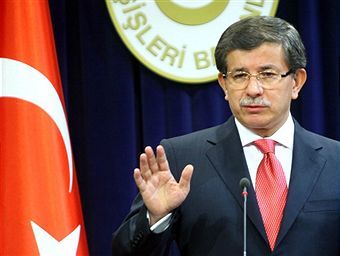 Last summer, I spoke to Turkey’s foreign minister, Ahmet Davutoglu, about the Mavi
Marmara row. Davatoglu was not only animated, but clear on what he thought. Unless Israel apologised, he said, the “relationship would change”. Now, Turkey has reacted to the
publication of a UN report (which insists that Israel’s naval blockade of Gaza was legal but that Israeli soldiers used unreasonable force) by following through on some of Davutoglu’s threats. Many
military agreements between Turkey and Israel have been suspended and the Israeli ambassador has been expelled. The Turkish Prime
Minister, Recep Erdogan, has also warned that relations will disintegrate further unless Israel
offers an apology, pays compensation and removes the embargo against the Gaza Strip. Israel maintains that there would be no apology.
Last summer, I spoke to Turkey’s foreign minister, Ahmet Davutoglu, about the Mavi
Marmara row. Davatoglu was not only animated, but clear on what he thought. Unless Israel apologised, he said, the “relationship would change”. Now, Turkey has reacted to the
publication of a UN report (which insists that Israel’s naval blockade of Gaza was legal but that Israeli soldiers used unreasonable force) by following through on some of Davutoglu’s threats. Many
military agreements between Turkey and Israel have been suspended and the Israeli ambassador has been expelled. The Turkish Prime
Minister, Recep Erdogan, has also warned that relations will disintegrate further unless Israel
offers an apology, pays compensation and removes the embargo against the Gaza Strip. Israel maintains that there would be no apology.
The Turkish government’s actions defy the UN report’s recommendation that “Turkey and Israel should resume full diplomatic relations, repairing their relationship in the interests of stability in the Middle East.” It also overlooks a number of inconvenient issues about the raid, such as the allegation that its main organiser, ÝHH, is in the words of the Daily Telegraph “a radical Islamist group masquerading as a humanitarian agency”.
The problem is that both the Turkish and Israeli governments are made up of hard men who don’t like to apologise. Israel’s Netanyahu, already under pressure in the run up to the September vote in the United Nations on Palestinian statehood, does not want to look weak. Meanwhile, Turkey’s Erdogan is having little luck in extending the limits of Turkey’s foreign policy ambitions. Having seen itself as a regional power-in-the-making, Turkey now finds that it cannot even dissuade Syria’s Bashir al-Assad from cracking down on protests and sending thousands of refugees across to Turkey. So there is a confluence of personal ire and political interests: a strong stance against Israel makes up for any hint of weakness.
But with anti-Israel rhetoric on the rise in Egypt and the Syrian regime desperate for any diversion, Turkey’s actions are likely to set back the cause of change in the region rather than promote it. Only a few months ago, a prominent UAE officer said Israel was behind all the revolutions in the Middle East. Refocusing attention back to Israel is very convenient for the region’s despots, impeding the progress of the Arab Spring.
Turkey’s friends – the United States and Britain in particular – have a special role in calming Ankara down and insisting that it is in the region’s interest to solve this diplomatic crisis. Asking Israel for an apology is too much, but Israel’s refusal at least to acknowledge some responsibility is unhelpful. So pressure should be brought on Israel too. The UN vote on Palestinian membership could pass by some 150 vote, so Israel is likely to be further isolated. Getting into a fight with Turkey now is a case of poor strategic thinking in Jerusalem and Israel’s friends should tell the Netanyahu so.






Comments